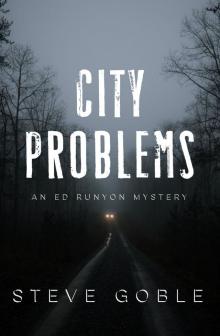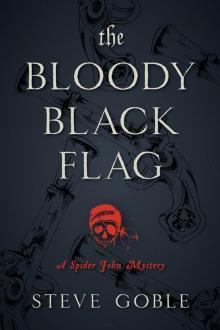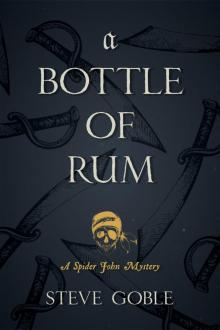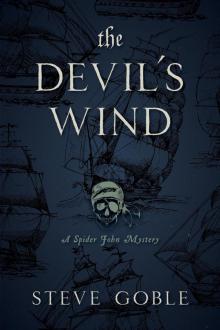- Home
- Steve Goble
The Devil's Wind
The Devil's Wind Read online
ALSO BY STEVE GOBLE
The Bloody Black Flag
Published 2018 by Seventh Street Books®, an imprint of Prometheus Books
The Devil’s Wind. Copyright © 2018 by Steve Goble. All rights reserved. No part of this publication may be reproduced, stored in a retrieval system, or transmitted in any form or by any means, digital, electronic, mechanical, photocopying, recording, or otherwise, or conveyed via the internet or a website without prior written permission of the publisher, except in the case of brief quotations embodied in critical articles and reviews.
Cover design by Nicole Sommer-Lecht
Cover illustrations © Shutterstock
Cover design © Prometheus Books
This is a work of fiction. Characters, organizations, products, locales, and events portrayed in this novel either are products of the author’s imagination or are used fictitiously.
Inquiries should be addressed to
Seventh Street Books
59 John Glenn Drive
Amherst, New York 14228
VOICE: 716–691–0133 • FAX: 716–691–0137
WWW.SEVENTHSTREETBOOKS.COM
22 21 20 19 18 • 5 4 3 2 1
Library of Congress Cataloging-in-Publication Data
Names: Goble, Steve, 1961- author.
Title: The devil’s wind : a Spider John mystery / by Steve Goble.
Description: Amherst, NY : Seventh Street Books, an imprint of Prometheus Books, 2018. | Series: A Spider John Mystery ; book 2
Identifiers: LCCN 2018016708 (print) | LCCN 2018019981 (ebook) | ISBN 9781633884854 (ebook) | ISBN 9781633884847 (paperback)
Subjects: LCSH: Pirates—Fiction. | Murder—Investigation—Fiction. | BISAC: FICTION / Mystery & Detective / Historical. | FICTION / Historical. | GSAFD: Historical fiction. | Mystery fiction.
Classification: LCC PS3607.O27 (ebook) | LCC PS3607.O27 D48 2018 (print) | DDC 813/.6—dc23
LC record available at https://lccn.loc.gov/2018016708
Printed in the United States of America
For Rowan, my lighthouse.
Contents
Cover
Also by Steve Goble
Title Page
Copyright Page
Dedication
1
2
3
4
5
6
7
8
9
10
11
12
13
14
15
16
17
18
19
20
21
22
23
24
25
26
27
28
29
30
Author’s Note
Acknowledgments
About the Author
1
JANUARY 1723
“Do not take the cutlass, Odin. It makes you look like a bloody pirate.”
Odin stopped before the Phoenix Tavern’s swinging doors and glared back at Spider John Rush. Caribbean sunlight streamed in around him, and he stood in silhouette, with the wide-brimmed hat on his head and the cutlass dangling from his belt making him look every inch the sea thief. “And what should I look like, Spider John?”
Spider swallowed his tot of rum—his third of the young morning—then swiveled on his barstool to stare into the one-eyed bastard’s face. The hideous scars where half of Odin’s face had been ripped off long ago were hidden in shadow, for which Spider was thankful. He had come to regard Odin, crazy though he may be, as a friend after all their shared adventures, but still had difficulty looking at the man.
“I am serious, Odin. There are navy fellows out there looking for us. You think them dull, but they may be sharp enough to reckon we would show when Dobbin swings. They will be watching for us.”
Odin drew the cutlass from its scabbard, stirring the sun-drenched dust motes. “Then I reckon I just might need this bloody goddamned thing. Aye? Ha!” Odin rushed out of the tavern.
Spider winced. “Bloody stubborn Scot.” There was no talking sense into a man who had survived piracy as long as Odin had. The man was at least sixty, judging by his appearance and stories.
“Is that fellow always so reckless?” Duncan, the barkeeper, deftly mopped up a spill on the scarred oak.
7
“Aye,” Spider answered quietly. “He owns an unlikely lifespan, for a man who was—was, I say—a pirate for most of his life. Dangerous profession, to be sure, yet Odin still lives and breathes. It has made him rather fearless, and he won’t heed reality.”
“Reality?”
“Odin and I are wanted men, Duncan.”
The barkeeper nodded.
Spider peered out a window and watched Odin shamble down a dirty road. The old man often bragged of sailing with Blackbeard and wrestling giant squid and screwing mermaids. If Odin wanted to wave a blade in front of King George’s valiant fellows, there probably was no stopping him.
Most days, Spider found Odin’s unrepentant attitude amusing. Today was not one of those days.
“You stay the hell away from me and the boy, then, Odin,” Spider muttered. “Me and Hob, we ain’t bloody pirates no more, even if you want to be one.”
“More rum, John?” Duncan held up a bottle. The man leaned across the bar and whispered. “And, for God’s sake, quit talking out loud about pirates. I can vouch for most of these folk, but not all.”
Spider took a quick glance around the taproom and nodded.
“Maybe you have had enough rum,” Duncan said, scratching his neatly trimmed beard.
“Jesus, no,” Spider replied. “I’m going to watch a friend die. And I may bloody well be next. There is no goddamned such thing as too much rum.”
Duncan, an old sailing mate from long ago, sighed heavily and poured Spider another. It was gone within three heartbeats.
An hour or so later, after slipping through the puddle-riddled streets and alleys of Port Royal and hopping aboard a wagon full of people eager to see pirates swing, Spider felt utterly alone in the crowd that gathered before the gallows.
That could be my noose, he thought.
The gallows, still dark and dripping from the morning’s brief rain, stood strong and sturdy in the brisk Jamaican wind, a counterpoint to the swaying palms nearby. Spider looked at the solid timbers and the dangling nooses and imagined himself up there, shaking, silently asking God’s forgiveness while awaiting the sudden final drop.
That image had haunted him a long, long time. It haunted most pirates.
Spider tried to convince himself that most of the danger to him and his friends had passed. His Majesty’s Ship Austen Castle, the frigate that was supposed to have carried them to England as prisoners on charges of piracy and espionage, had sailed from Port Royal a week ago. On that score, at least, his escape was complete. But years on the piratical account had taught him to be ever wary, and there was another navy frigate anchored in the harbor. So long as the king’s men were here, and so long as criers spoke of bounties, no pirate was safe. Not even one whose most fervent wish was to leave piracy behind and return to his wife and son. He touched the carved pendant dangling from his neck, and, for a moment, pictured himself handing it to her.
Since the escape, Spider had assumed a false name, that of a good friend who had passed beyond this life and no longer had need of it. John Coombs, he was called now. Not John Rush.
Spider also had been careful to alter his appearance; his long brown hair was now cropped short, and he had allowed his beard to grow shaggy to hide the vicious sword cut across his chin, earned in winning his unlikely freedom. Th
at beard got in the way when he sawed wood, hammered nails, or did other tasks common to ship’s carpenters, and he vowed to cut it the first chance he got, but it was worthwhile as long as he was trapped here on land.
Spider kept his hands tucked into his pockets as much as possible these days, to hide the stub where the small finger of his left hand used to be. That was the kind of telltale detail eyewitnesses might remember.
Despite all those precautions, and even though he and his shipmates had managed to hide out at his old shipmate’s tavern, Spider was nervous. The unsettling nature of being ashore, where danger might step out of the crowd or any looming door or alleyway at any moment, always rattled him. But it was worse than usual now. The dangling nooses seemed to beckon him. He deserved to swing on the gallows as much as any of the poor souls who would be hung today.
He’d never wanted to be a pirate, of course, and he prayed to God he would never have to be one again, but he’d been caught up in that world and he’d done the bloody work necessary to survive in it.
A ship’s carpenter by training, he’d been forced to join a pirate band at a young age. The choice then—as it remained throughout the years of his pirate career—was to rob, fight, and kill, or be tossed overboard.
Only good fortune had placed him here among the watchers instead of on the gallows.
I will not squander this chance, he thought. I will work my way home, to Em and little Johnny. I will live a better life, by God.
Spider scanned the throng gathered for the hanging, seeking soldiers or sailors or witnesses who might recognize him, but his eyes were constantly drawn back to the skeletal timber frame and to the long, ugly, choking ropes. One of those ropes soon would break the neck of a former shipmate.
Spider inhaled deeply, hoping the familiar scents of fish and sun-heated tar riding the sea breeze would calm him. He wished he’d drunk a good deal more rum this morning, too. Instinct told him to flee this crowd that had hiked or ridden from Port Royal and Kingston to see the dreadful spectacle, but he needed to be here. Dobbin deserved at least that much.
Several men accused of piracy were to swing this day. Such hangings were common now in Jamaica, though the island once had been safe refuge for those who made their own law and lived by their own wits on the high seas. Even notorious pirates such as dapper Calico Jack Rackham and his famed pirate woman, Anne Bonny, had not eluded the law. Rackham had ended his piratical reign on the gallows. Bonny had been jailed and, if rumor was true, had escaped hanging only by pleading her belly. Not even the bloody English government would hang a pregnant woman.
“Watch when they drop,” said a fellow nearby, talking to a girl of about eight. “The eyes bulge, pop out sometimes. You’ll see. One lad’s eye plopped into my aunt’s lap, it did! Couple years ago. Damned truth, that is.”
Spider figured a knife in the slobbering boor’s neck might make some eyes pop, too, but that would draw attention he could ill afford.
“Is that true, about eyes poppin’ out?” Spider turned to see young Hob, munching on a sugar apple. He had not seen the boy approach but was glad to have him here now. “No. Eyes do not pop out of their heads. Not that I have ever seen. Now hush.”
Spider peered at faces and listened to whispers. He saw one fellow, not far off, who had a sailor’s tan and a familiar look. Had he been one of the salts aboard HMS Austen Castle when Spider and his friends had escaped? Spider could not be sure, so he tugged at Hob’s sleeve and edged farther away, then tilted his hat to hide his face from the man.
Some folks in the throng seemed eager to see justice done, while others bemoaned the end of the days when pirates gave Jamaica’s economy a bigger boost; there were many ashore who benefited from the illegal business conducted on the outlaw sea, and some here who even loved the men about to die. Spider noted a tear on one deeply tanned woman’s face, then wiped away one of his own.
“The noose, Hob, is the inevitable destination for a man who sails the devil’s wind,” Spider whispered to the young man next to him. “You remember that.”
“Are you unwell, Spider John?” Hob tilted his head, scrunching his boyish face against the sunlight.
Spider gulped. “Be still, I am fine. I am glad you are here. You need to see this. Learn from this.” At fifteen years of age, Hob still had a great deal to learn.
“I liked Dobbin. He doesn’t deserve this.”
We all deserve this, Spider thought. We just got lucky, and Dobbin did not.
Spider knew the sweat that dripped from him was not caused by the hot Caribbean sun. He was accustomed to hot weather, and the strong breeze would have been enough to cool him under normal circumstances. This sweat was the result of nerves and tension. The urge to simply turn and go raged in his mind, but he willed himself to remain. Dobbin would pass through the gates of hell today, once the sun reached its zenith. Spider would see him off.
A quick glance at the sun over the waving palms behind him told Spider it would not be long now. A drumroll confirmed it, and the crowd hushed. A dozen English soldiers, armed and stoic and dapper in uniform, led four men to the gallows. Bayonets flashed in the sun. The gathered laborers, smiths, fishermen, bakers, whores, and sailors opened the way for the troops with practiced ease. This was not their first hanging.
Beyond the gallows, ships anchored in the harbor began firing guns to mark the occasion. Those from the frigate HMS Southampton seemed to Spider to be the loudest, and rang out with a sense of omen. That was a navy ship, here to escort a merchant convoy to Boston. Spider, Odin, and Hob would be sailing with that convoy, and Spider hoped Southampton would keep her distance.
Black smoke drifted swiftly across the waters, accompanied by thunderous echoes, and in moments Spider could smell it. The familiar odor prompted memories of combat, and he inhaled deeply. For one ridiculous moment, he envisioned himself stealing a sword from a soldier and hacking his way to the gallows to cut Dobbin free.
Fairy tale thoughts, he told himself. This is reality. This is what happens to pirates.
He caught sight of Odin nudging his way closer to the gallows. The horrid old bastard was easy to pick out of the crowd, being taller than six feet and wearing a ridiculously broad-brimmed hat he hoped would hide the ghastly scars where his right eye used to be. And, of course, he still had the goddamned sword. Spider wondered where the man had stolen the rusty thing.
Odin wiped at his brow constantly with a white cloth, not to mop up sweat but as a further measure to hide his wretched face. No one who had seen that face was likely to ever forget it, and recognition could mean hanging. Spider noted that Odin’s other hand never strayed far from the hilt of his blade.
Odin had heeded Spider’s request to keep himself apart, and moved farther away still after noting Spider’s gaze. Now the old man peered up at the gallows, which threw a shadow across his face. “Cover that damned gash,” Spider growled under his breath—though he was too far away from the old salt to be heard. Even so, Odin raised the cloth again to his face as though he’d actually heard his shipmate’s curse.
On the wooden platform, holding an open Bible but reciting its words from memory, a dour minister quietly intoned a message of divine justice. “It is joy to the just to do judgment, but destruction shall be to the workers of iniquity,” he said, eyes gazing toward heaven. To Spider, the bastard looked as though he’d never known a happy day.
After that opening, the dark-haired minister made no effort to be heard above the murmurs of the crowd, and few people paid him attention. The preacher gabbled on, softly, but most gazes were fixed upon the condemned men.
Spider did not know three of the men being led to the nooses, but the third in line was Dobbin, the unlucky soul who had been captured while Spider and a few other prisoners escaped. Spider wondered how Dobbin had ended up in captivity. The last time he’d seen the man, Dobbin was being pulled into a rowboat by another fleeing shipmate while musket balls whizzed past them.
Spider scarcely recognized Dobbin
. The man’s face was all wrinkles, sweat, and ash, his hair matted like a gray tangle of dead seaweed. His eyes were closed, and he merely walked forward, stooping, and let the soldiers guide him. Dobbin mumbled softly, and Spider recalled how difficult it could be to discern the toothless sailor’s words. Spider was certain Dobbin’s words now were addressed to the one who would not have that difficulty, and he added his own small prayer as well. Be merciful, Lord. Lend Dobbin courage and strength.
Poor Dobbin. Why had luck abandoned him, yet smiled upon others? Until a couple of days ago, when the impending hangings were announced and the names of the condemned were bandied about in taverns and on wharves throughout Port Royal, Spider had not known what had become of Dobbin. Spider had started drinking harder upon hearing the man was waiting for execution on the gallows. He scratched at his own neck, where he could feel the imagined rope’s bite.
“Dobbin looks bad,” Hob whispered. “No life left in him.”
Spider turned to the boy, who had become something of a surrogate son to him during their deadly adventures.
“Aye. He is resigned,” Spider said. “Maybe that’s for the best. No use fighting now.”
Hob whisked his wind-whipped blond hair from his wide blue eyes and took in the scene, his gaze following the condemned men up the steps and beneath the waiting nooses. Hob’s vision of piracy was fueled by too much imagination and romance and not enough hard reality. Not even the bloody capture of their ship and the ensuing arrest had wholly changed the boy’s mind. Spider hoped that seeing Dobbin die on a noose might shake those damned dreams of pirate glory.
They had a chance now, legitimate jobs lined up on a merchant vessel shipping molasses and rum to Boston, thanks to a good word from Duncan. Spider would be a carpenter and Hob a carpenter’s mate—although the lad couldn’t saw a straight line if Jesus himself assisted. They would be able to start new lives.
The idea bored Hob, of course, who preferred pirate gold and living beyond the reach of kings to learning how to join two pieces of wood. Hob thought he would live forever and win every cast of the dice.

 City Problems
City Problems The Bloody Black Flag
The Bloody Black Flag A Bottle of Rum
A Bottle of Rum The Devil's Wind
The Devil's Wind